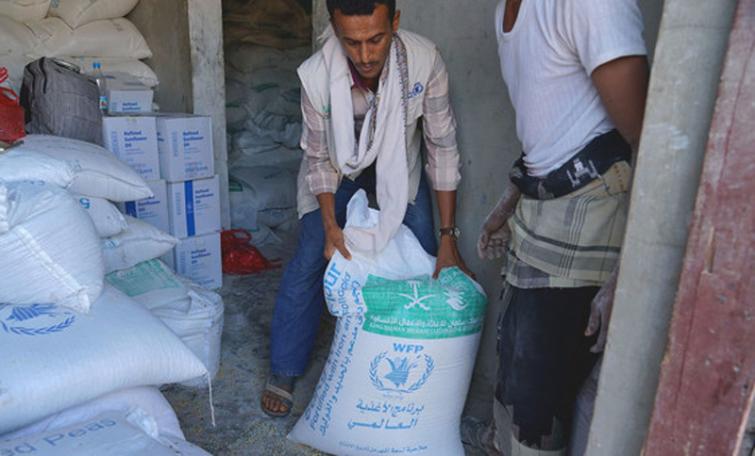
New York: Enough food is produced today to feed everyone on the planet, but hunger is on the rise in some parts of the world, and some 821 million people are considered to be “chronically undernourished”. What steps are being taken to ensure that everyone, worldwide, receives sufficient food?
Thanks to rapid economic growth, and increased agricultural productivity over the last two decades, the number of people in the world who aren’t getting enough to eat has dropped by almost a half, with regions such as Central and East Asia, Latin America and the Caribbean making great strides in eradicating extreme hunger. However, that’s against a background of the global population rising by nearly two billion.
And now recent trends suggest that the hunger problem persists: particularly in Africa and South America, where there are new indications that undernourishment and severe food insecurity are on the rise.
In Sub-Saharan Africa the number of undernourished people has increased, from some 195 million in 2014, to 237 million in 2017. Poor nutrition causes nearly half of deaths in children under five in the region, some 3.1 million children per year.
Achieving the 2030 goal of Zero Hunger, in other words ensuring that nobody goes hungry wherever they are in the world, remains a major challenge.
According to a recent World Food Programme (WFP) the causes of increased hunger include environmental degradation and drought – both of which are impacted by climate change – as well as conflict.
The lack of biodiversity in agriculture is also a cause for concern, and is held responsible for homogenous diets which limit access to food, leading to persistent malnutrition and poverty: current agricultural production revolves around just 12 crops, and around 60 per cent of all calories consumed come from just four crops: rice, wheat corn and soy, despite the wealth of potential foodstuffs around the world.
The good news is that, around the world, innovation and technology are being used to improve a wide range of food production challenges. Here are some examples
Papuan Pigs in the cloud
In Papua New Guinea, where pigs play an important role in the country’s culture and economy, no celebration is complete without a pork roast. The rising global demand for the meat means that farmers now have the opportunity to sell to overseas, as well as local, markets.
However, to do so they need to prove that their livestock meets internationally recognised standards, and this is where the latest digital technology can help.
A digital tracking system has been deployed which for the first time, verifies important information about the pigs. It includes their pedigree, what they were fed and, if they feel sick, what medicines they were prescribed, giving importers and consumers confidence in the quality of the meat they buy.
The system, designed with the help of the UN’s Food and Agriculture Organization (FAO), and International Telecommunications Unit (ITU), is being piloted in the Jiwaka region.The broadband network there is being improved, so that farmers can more easily use subsidised smartphones to update livestock records, which is stored online, in the cloud.
Weeding out the chemicals in India
Although initially credited with boosting crop yields and saving millions from famine, fertilizers and other chemicals are now under scrutiny in India. Fertilizers are blamed with soil degradation, and resulting stagnant productivity; health issues; and high costs that push farmers into debt. A tragic consequence is the thousands of reported suicides each year in the farming community.
However, in Andhra Pradesh, the UN Environment Programme is supporting an initiative designed to remove chemicals from the farm, using a technique called “Zero Budget Natural Farming” (ZBNF) which it hopes will transform and protect local food systems, and the long-term well-being of farmers.
This form of agriculture takes advantage of the latest scientific knowledgeand eliminates the need for chemicals. The core principles of ZBNF involve coating seeds with formulas made from cow urine and dung; applying these ingredients to the soil; covering the ground with crops and crop residues; and ensuring the soil is aerated.
This reliance on home-grown and readily available resources, allows the farmers involved in the programme to increase biodiversity and rejuvenate their soils, thus cutting costs and increasing incomes. The regional government of Andhra Pradesh plans to scale up the scheme to some six million farmers by 2024, which would make it India’s first “natural farming” state.
Waste not, want not in Egypt
In Egypt, where about half of tomatoes and a third of grapes are lost through inefficient practices before they reach the consumer, the Food and Agriculture Organization (FAO) has partnered with the Egyptian government and cooperatives to find ways to limit food losses caused by production surpluses and inefficient practices. This video outlines some of the pragmatic solutions that have resulted from this collaboration.Around one-third of all food produced globally is either lost or wasted, a staggeringly profligate situation that is estimated to cost the global economy some $1 trillion per year. WFP is trying to stem losses through initiatives such as its #StopTheWaste awareness campaign, launched in early October. The campaign aims to build a global movement and highlight simple solutions that we can all take to fight food waste.
Support Our Journalism
We cannot do without you.. your contribution supports unbiased journalism
IBNS is not driven by any ism- not wokeism, not racism, not skewed secularism, not hyper right-wing or left liberal ideals, nor by any hardline religious beliefs or hyper nationalism. We want to serve you good old objective news, as they are. We do not judge or preach. We let people decide for themselves. We only try to present factual and well-sourced news.







